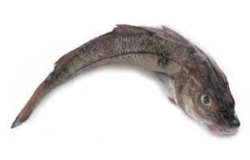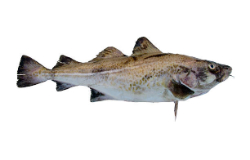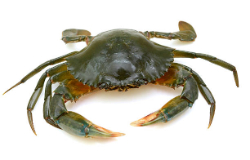Haddock Nutrition facts
Haddock

Haddock is one of the popular fish frequently featuring in British and Scandinavian cuisine for its non-oily, firm, and lean white flesh.
Haddock belongs to the Cod-family of benthic fish living in cold-waters on either side of the Northern Atlantic coasts.
Scientific name: Melanogrammus aeglefinus.
Haddock fish is also known by many local names such as scrod in the US, and eglefino in France.
Similar Food
-
 Anchovies 131 Cal
Anchovies 131 Cal -
 Atlantic cod 82 Cal
Atlantic cod 82 Cal -
 Alaska pollock 92 Cal
Alaska pollock 92 Cal -
 Blue crab 87 Cal
Blue crab 87 Cal -
.jpg) Branzino (Sea bass) 97 Cal
Branzino (Sea bass) 97 Cal
Source of Calorie
74
Calories
-
Carbs0 g 0%
-
Protein16.32 g 94%
-
Fat0.45 g 6%
How long to burn off 74 Calories?
*Approximate base minutes for a 25-year-old, 65 kg adult at moderate intensity.
Swimming
12
min
Jogging
10
min
Cycling
10
min
Walking
18
min
| Nutrition Principle | Nutrition Value | Percentage of RDA |
|---|---|---|
| Principle | ||
| Energy | 74 Kcal | 4% |
| Carbohydrates | 0 g | 0% |
| Protein | 16.32 g | 29% |
| Total Fat | 0.45 g | 2% |
| Cholesterol | 54 mg | 18% |
| Dietary Fiber | 0 g | 0% |
| Vitamins | ||
| Folate total | 12 μg | 3% |
| Niacin | 3.363 mg | 21% |
| Pyridoxine | 0.281 mg | 21% |
| Riboflavin | 0.057 mg | 4.3% |
| Thiamin | 0.020 mg | 1.75% |
| Vitamin-A | 57 IU | 2% |
| Vitamin-B12 | 1.83 μg | 76% |
| Vitamin-C | 1.1 mg | 2% |
| Electrolytes | ||
| Sodium | 213 mg | 14.2% |
| Potassium | 286 mg | 6% |
| Minerals | ||
| Calcium | 11 mg | 1% |
| Iron | 0.17 mg | 2% |
| Magnesium | 21 mg | 4% |
| Phosphorus | 227 mg | 32% |
| Selenium | 25.9 mg | 47% |
| Zinc | 0.32 mg | 3% |
| Ω-3 Fatty acids | ||
| EPA (20:5 n-3) | 0.042 g | -- |
| DPA (22:5 n-3) | 0.005 g | -- |
| DHA (22:6 n-3) | 0.089 g | -- |